Guilie Castillo-Oriard's Blog, page 12
May 11, 2015
The Miracle of Small Things -- #AtoZChallenge Giveaway Results!
Sorry for the delay, y'all... You'd think after 3 -- or is it 4? -- years of A-to-Z-ing I'd have learned not to underestimate the post-April burnout, but every year it's the same. Come May, I'm a useless blogger. (More than usual, I mean.)
I did, finally, get around to collecting the names of those who guessed right first in the Papiamentu guessing game, and writing those names on itty bitty pieces of paper...
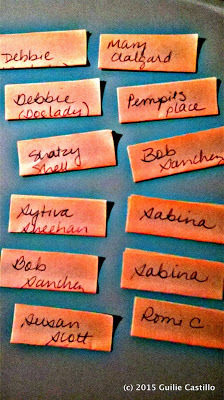 The nine participating names, the twelve itty bitty pieces of paper
The nine participating names, the twelve itty bitty pieces of paper
(Debbie, Bob, and Sabina had two correct guesses each, so they participated twice)
and putting those in a hat...
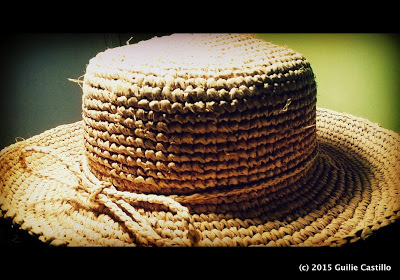 A beach hat -- of course ;)
A beach hat -- of course ;)
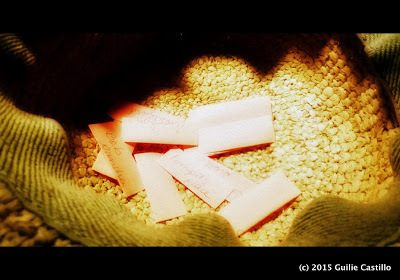
and blindly selecting three, which means
(drumroll, please)
we have the winners!!!
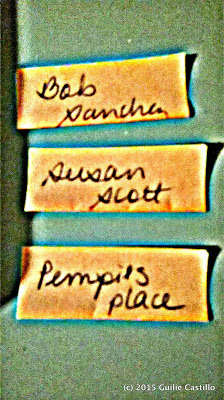
Congratulations Bob, Susan, and the blogger at Pempi's Palace! I'll drop by your blogs to let you know, and we can communicate (email me at guilie (dot) quietlaughter (at) gmail (dot) com, or via Facebook) to figure out how to get your copy of The Miracle of Small Things to you. The book won't be released until this summer, July probably, so we have time to iron out details.
Thanks to everyone that joined in... I hope you had fun with Papiamentu's sometimes-misleading vocabulary; I certainly have, during my twelve years on this island ;)
I did, finally, get around to collecting the names of those who guessed right first in the Papiamentu guessing game, and writing those names on itty bitty pieces of paper...
 The nine participating names, the twelve itty bitty pieces of paper
The nine participating names, the twelve itty bitty pieces of paper(Debbie, Bob, and Sabina had two correct guesses each, so they participated twice)
and putting those in a hat...
 A beach hat -- of course ;)
A beach hat -- of course ;)
and blindly selecting three, which means
(drumroll, please)
we have the winners!!!

Congratulations Bob, Susan, and the blogger at Pempi's Palace! I'll drop by your blogs to let you know, and we can communicate (email me at guilie (dot) quietlaughter (at) gmail (dot) com, or via Facebook) to figure out how to get your copy of The Miracle of Small Things to you. The book won't be released until this summer, July probably, so we have time to iron out details.
Thanks to everyone that joined in... I hope you had fun with Papiamentu's sometimes-misleading vocabulary; I certainly have, during my twelve years on this island ;)
Published on May 11, 2015 18:51
April 30, 2015
X + Y + Z -- Three (Last) Quirks of #Curaçao (#AtoZChallenge 2015)
X-ing
In Curaçao, crossings are one of the many quirks used to trap us foreigners into hilarious clueless entertainment for locals.
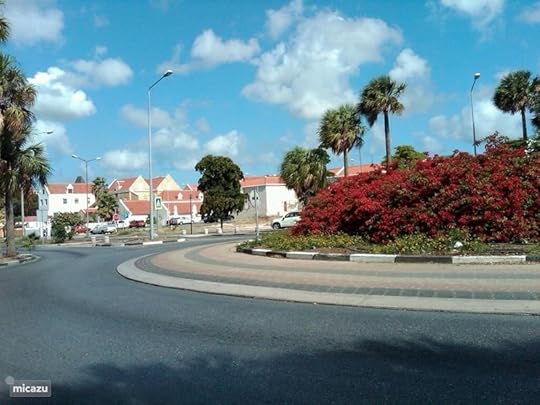 Roundabout in OtrobandaThere's your normal, everyday, run-of-the-mill roundabout or traffic circle. We all know the rules for that: if you're in the circle, you have preference. If you're outside the circle, you yield.
Roundabout in OtrobandaThere's your normal, everyday, run-of-the-mill roundabout or traffic circle. We all know the rules for that: if you're in the circle, you have preference. If you're outside the circle, you yield.
And then there's the plénchi di tráfiko.
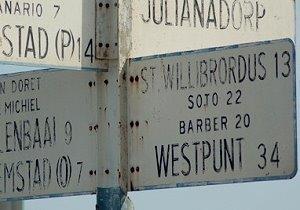 Part of the reason this post is so late is because I couldn't
Part of the reason this post is so late is because I couldn't
get a good image of a plénchi di tráfiko. Sorry. But this sign
is just before one of the island's most well-transited plénchi di tráfiko:
the one on the way to Banda Abou and Westpunt and the most gorgeous
beaches you've seen in your life.To me, it looks for all the world like a roundabout -- sure, a bit irregular, like not the perfect circle roundabouts tend to be, but a roundabout nonetheless. A circular intersection. And so, as I enter into one, I yield.
And get honked all the way to Banda Abou.
In a plénchi di tráfiko it's traffic from the right that has preference. So as I enter I have preference, but then I must yield to the next intersecting road -- because it's coming from my right.
(It took me a good two years to learn that, because there are no signs.)
Yu di Kòrsou [YOU-dee-course-OW] Literally: young (as in "child") of Curaçao
 Yu di Kòrsou, shortened to YDK, has become ubiquitous.
Yu di Kòrsou, shortened to YDK, has become ubiquitous.
"United we stand," reads the caption.Yu di Kòrsou is what Curaçao natives call themselves -- not Curaçaoans, not Antilleans. But one can become a yu di Kòrsou, too, and not necessarily by a change in citizenship. When someone displays behavior that's unique to Curaçao -- using, for instance, the expressions in this A-to-Z series -- or when someone has lived in Curaçao for a long time, or even if they haven't but exhibit obvious and extreme love for the island and its food and customs... Yep. All of these are qualifications for being a yu di Kòrsou.
But the opposite is also true. If you're critical of the lifestyle, if you don't like Curaçao food, if you're no fan of Carnaval or Sèu or the tumba festival or if you don't like tambú, or if you just think differently -- what some would call out of the box -- then it doesn't matter if you were born in Curaçao and have lived all your life here. You'll still find yourself seldom being referred to as a yu di Kòrsou. Especially if you're white. And if your skin is dark, then you'll more often hear the pariah term of black macamba (wigger, but in reverse).
And last but certainly not least:
zjogoro [zhoh-GOH-roh] English: hangover
Perhaps the most important addition to your vocabulary if you ever visit Curaçao ;)

This is it, the end of the #AtoZChallenge. I've had a blast researching for these posts, and I hope you've enjoyed them -- and, besides learning some funky expressions, gained a bit of insight to this cultural melting-pot of an island I've chosen to call home. It's been a pleasure to share Curaçao with you.
Te aki ratu, dushi hende!
Okay, we'll use that phrase as the last bonus question of the series. No hints... well, just one. In English, the equivalent is often paired with alligator :)
(Find updates on the giveaway here, and come back on May 8th for the announcement of the three winners of THE MIRACLE OF SMALL THINGS, a collection of short stories set in Curaçao.)
In Curaçao, crossings are one of the many quirks used to trap us foreigners into hilarious clueless entertainment for locals.
 Roundabout in OtrobandaThere's your normal, everyday, run-of-the-mill roundabout or traffic circle. We all know the rules for that: if you're in the circle, you have preference. If you're outside the circle, you yield.
Roundabout in OtrobandaThere's your normal, everyday, run-of-the-mill roundabout or traffic circle. We all know the rules for that: if you're in the circle, you have preference. If you're outside the circle, you yield.And then there's the plénchi di tráfiko.
 Part of the reason this post is so late is because I couldn't
Part of the reason this post is so late is because I couldn'tget a good image of a plénchi di tráfiko. Sorry. But this sign
is just before one of the island's most well-transited plénchi di tráfiko:
the one on the way to Banda Abou and Westpunt and the most gorgeous
beaches you've seen in your life.To me, it looks for all the world like a roundabout -- sure, a bit irregular, like not the perfect circle roundabouts tend to be, but a roundabout nonetheless. A circular intersection. And so, as I enter into one, I yield.
And get honked all the way to Banda Abou.
In a plénchi di tráfiko it's traffic from the right that has preference. So as I enter I have preference, but then I must yield to the next intersecting road -- because it's coming from my right.
(It took me a good two years to learn that, because there are no signs.)
Yu di Kòrsou [YOU-dee-course-OW] Literally: young (as in "child") of Curaçao
 Yu di Kòrsou, shortened to YDK, has become ubiquitous.
Yu di Kòrsou, shortened to YDK, has become ubiquitous."United we stand," reads the caption.Yu di Kòrsou is what Curaçao natives call themselves -- not Curaçaoans, not Antilleans. But one can become a yu di Kòrsou, too, and not necessarily by a change in citizenship. When someone displays behavior that's unique to Curaçao -- using, for instance, the expressions in this A-to-Z series -- or when someone has lived in Curaçao for a long time, or even if they haven't but exhibit obvious and extreme love for the island and its food and customs... Yep. All of these are qualifications for being a yu di Kòrsou.
But the opposite is also true. If you're critical of the lifestyle, if you don't like Curaçao food, if you're no fan of Carnaval or Sèu or the tumba festival or if you don't like tambú, or if you just think differently -- what some would call out of the box -- then it doesn't matter if you were born in Curaçao and have lived all your life here. You'll still find yourself seldom being referred to as a yu di Kòrsou. Especially if you're white. And if your skin is dark, then you'll more often hear the pariah term of black macamba (wigger, but in reverse).
And last but certainly not least:
zjogoro [zhoh-GOH-roh] English: hangover
Perhaps the most important addition to your vocabulary if you ever visit Curaçao ;)

This is it, the end of the #AtoZChallenge. I've had a blast researching for these posts, and I hope you've enjoyed them -- and, besides learning some funky expressions, gained a bit of insight to this cultural melting-pot of an island I've chosen to call home. It's been a pleasure to share Curaçao with you.
Te aki ratu, dushi hende!
Okay, we'll use that phrase as the last bonus question of the series. No hints... well, just one. In English, the equivalent is often paired with alligator :)
(Find updates on the giveaway here, and come back on May 8th for the announcement of the three winners of THE MIRACLE OF SMALL THINGS, a collection of short stories set in Curaçao.)
Published on April 30, 2015 12:15
April 27, 2015
Weg'i Domino & Wara Wara -- Quirks of #Curaçao (#AtoZChallenge 2015)
The sharp crack of tiles against wood -- domino tiles, that is -- is a trademark sound of Curaçao streets. At every bus stop and taxi depot, at every snék (when the bachata music isn't too loud--and sometimes even then). Crack! Crack! Crack-CRACK-crack! They follow one another at impossible speed, as if the game is about who slaps them down faster.
And, in a way, I suppose it is.
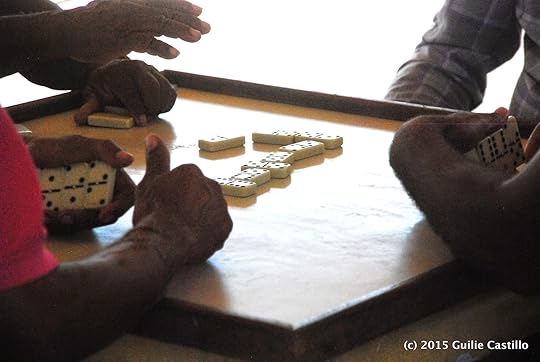 One of these taxi drivers at the Otrobanda depot gave me
One of these taxi drivers at the Otrobanda depot gave me
a curt nod as I held up my camera in a non-verbal question.
I snapped away for a good three minutes, but none of them ever looked
my way again.
Like those chess tables in parks, where it's a matter of pride how fast you make your moves, in Curaçao the weg'i dominoe is not just about the right plays but about the speed at which you make them.
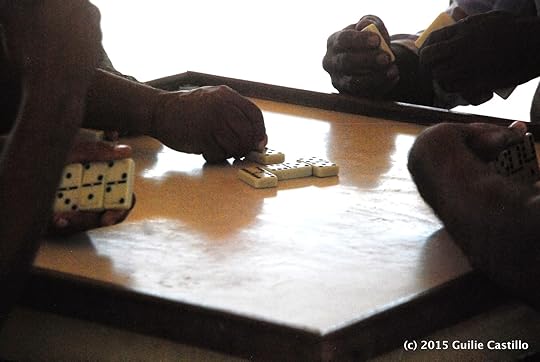
The full phrase is
wega di domino [WHE-gah dee DO-mee-noh] Literally: game of dominoe
but no one says that. It's always
weg'i domino [WHE-guee DO-mee-noh] ("game o' dominoe", I suppose comes closest)

Here's something really quirky about Curaçao (too quirky to use as a bonus question):
The Wara Wara [war-ah-WAR-ah], aka Cara-Cara elsewhere, is Curaçao's most ubiquitous (I'd say only, but what do I know) bird of prey. Out in the mondi (the wild) -- which is pretty close to civilization, really -- you can see them soaring up in the big blue, specks of brown flying high, high... Talk about a bird's eye view of the island.
And when you rent a car in Curaçao, it comes equipped with a Wara Wara.
 Yo, Wara Wara! I'm lost, swa. Any chance you know how to get to Montanja Abou?
Yo, Wara Wara! I'm lost, swa. Any chance you know how to get to Montanja Abou?
(Image source)No, Hertz doesn't have a roomful of cages with these birds in them, and they don't have one tetherered to each car's antenna. It's the GPS navigator. In Curaçao it's called Wara Wara . (God, I love this island.)
And, in a way, I suppose it is.
 One of these taxi drivers at the Otrobanda depot gave me
One of these taxi drivers at the Otrobanda depot gave mea curt nod as I held up my camera in a non-verbal question.
I snapped away for a good three minutes, but none of them ever looked
my way again.
Like those chess tables in parks, where it's a matter of pride how fast you make your moves, in Curaçao the weg'i dominoe is not just about the right plays but about the speed at which you make them.

The full phrase is
wega di domino [WHE-gah dee DO-mee-noh] Literally: game of dominoe
but no one says that. It's always
weg'i domino [WHE-guee DO-mee-noh] ("game o' dominoe", I suppose comes closest)

Here's something really quirky about Curaçao (too quirky to use as a bonus question):
The Wara Wara [war-ah-WAR-ah], aka Cara-Cara elsewhere, is Curaçao's most ubiquitous (I'd say only, but what do I know) bird of prey. Out in the mondi (the wild) -- which is pretty close to civilization, really -- you can see them soaring up in the big blue, specks of brown flying high, high... Talk about a bird's eye view of the island.
And when you rent a car in Curaçao, it comes equipped with a Wara Wara.
 Yo, Wara Wara! I'm lost, swa. Any chance you know how to get to Montanja Abou?
Yo, Wara Wara! I'm lost, swa. Any chance you know how to get to Montanja Abou?(Image source)No, Hertz doesn't have a roomful of cages with these birds in them, and they don't have one tetherered to each car's antenna. It's the GPS navigator. In Curaçao it's called Wara Wara . (God, I love this island.)
Published on April 27, 2015 05:00
April 26, 2015
Viña! (but not Del Mar) -- Quirks of Language in #Curaçao (#AtoZChallenge 2015)

viña [VEE-njah] Literally: vine
Yep. As in the vine that gives vineyards their name. In context, however, it does not mean vine -- it means wine.

Is it weird that, whenever I hear people order wine in Papiamentu -- red (viña korá) or white (viña blanku) -- I still half expect the waiter to come back with a strand of something leafy and green?
 Vines growing at an alarmingly fast rate in Curaçao's first vineyard.Did you know Curaçao now has its own winery? The Rock is growing viña, people -- the plant and the drink :) Gorgeous setting in an old landhuis (plantation house), right by the ocean... It's lovely even if you don't like wine. But if you do, first harvest bottles will be available this summer. (Yes, I'll sacrifice myself and have a private tasting to report here on the blog... Just for you ;) )
Vines growing at an alarmingly fast rate in Curaçao's first vineyard.Did you know Curaçao now has its own winery? The Rock is growing viña, people -- the plant and the drink :) Gorgeous setting in an old landhuis (plantation house), right by the ocean... It's lovely even if you don't like wine. But if you do, first harvest bottles will be available this summer. (Yes, I'll sacrifice myself and have a private tasting to report here on the blog... Just for you ;) )
Published on April 26, 2015 17:30
Unda Punda -- Quirks of Language in #Curaçao (#AtoZChallenge 2015)
I'm running behind, I know... It's been a hectic month. Besides the A-to-Z, my publisher and I are busy wrapping up THE MIRACLE OF SMALL THINGS for the NYC launch in September -- final edits and tweaks, illustrations (my idea, not so great in retrospect), planning, drumming up support from official sources... Anyway, more on all that later. The point is I apologize for the lack of consistency in these posts. And my unending gratitude to all you who keep coming back in spite of it :)
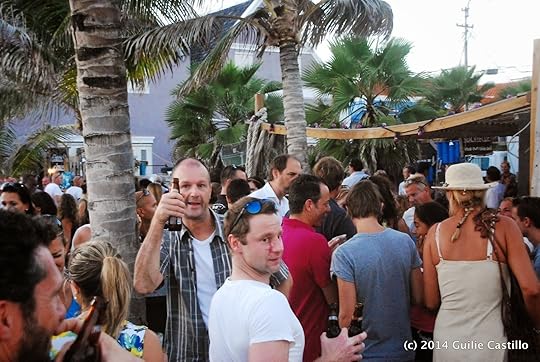 "Hey, Cor. Unda Punda?"
"Hey, Cor. Unda Punda?"
"Right here, swa!"Papiamentu doesn't have many U words. After months of research, only one friend came up with a U expression -- which, by the way, no one else seems to recognize, so it might well be him giving rein to his creativity and pulling my leg (and now all of yours -- kudos, Miguel). Or it might be a kind of in-joke, something only a certain group of people use.
Either way, I'd rather give you something of questionable origin and a disclaimer than forfeit U day. (And isn't the fact that people can make up this kind of stuff and feed it to us foreigners with impunity a pretty cool quirk, even if it's not exclusive to Curaçao?)
unda Punda [OON-dah POON-dah] Literally: where (is) Punda?
If you've been following this A-to-Z series (or if you read this post), you know this makes no sense. Punda is Side A of the island's capital. Anyone who speaks Papiamentu knows, without a shadow of a doubt, exactly where Punda is.
No, of course they're not asking for directions. What this means, according to my (debatably reliable) source, is where's it happening? Where's the party? Where's it at?
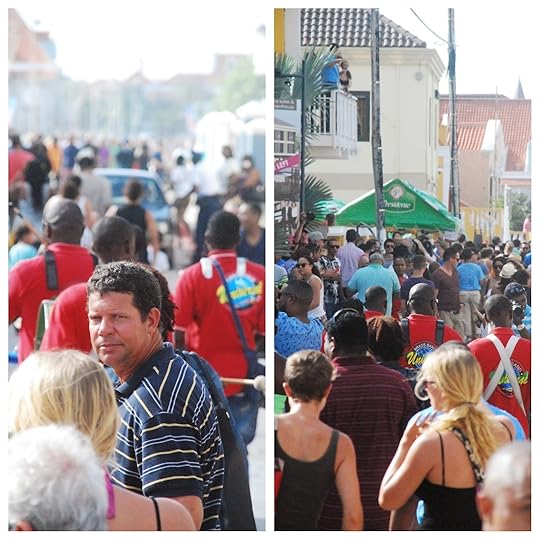 Dude's looking a bit clueless there. Bet you he'd be no help if you asked "Unda Punda?"You know what? I don't care if the expression actually exists, or whether anyone except my friend uses it. I'm going to start using it. It sounds cool.
Dude's looking a bit clueless there. Bet you he'd be no help if you asked "Unda Punda?"You know what? I don't care if the expression actually exists, or whether anyone except my friend uses it. I'm going to start using it. It sounds cool.
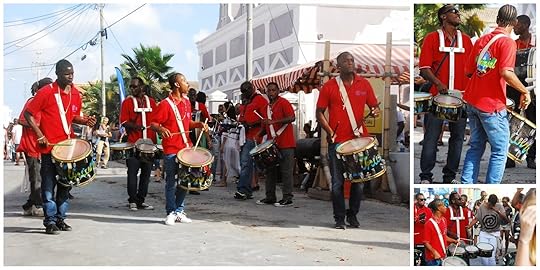 Fail-safe method to discover "unda Punda" -- follow the steel band. They'll know :)Congratulations to the blogger at Special Teaching at Pempi's Palace -- tiki is, indeed, "little". (After April, when someone asks you if you can speak Papiamentu, you can say, "a tiki" ;) )
Fail-safe method to discover "unda Punda" -- follow the steel band. They'll know :)Congratulations to the blogger at Special Teaching at Pempi's Palace -- tiki is, indeed, "little". (After April, when someone asks you if you can speak Papiamentu, you can say, "a tiki" ;) )
 "Hey, Cor. Unda Punda?"
"Hey, Cor. Unda Punda?""Right here, swa!"Papiamentu doesn't have many U words. After months of research, only one friend came up with a U expression -- which, by the way, no one else seems to recognize, so it might well be him giving rein to his creativity and pulling my leg (and now all of yours -- kudos, Miguel). Or it might be a kind of in-joke, something only a certain group of people use.
Either way, I'd rather give you something of questionable origin and a disclaimer than forfeit U day. (And isn't the fact that people can make up this kind of stuff and feed it to us foreigners with impunity a pretty cool quirk, even if it's not exclusive to Curaçao?)
unda Punda [OON-dah POON-dah] Literally: where (is) Punda?
If you've been following this A-to-Z series (or if you read this post), you know this makes no sense. Punda is Side A of the island's capital. Anyone who speaks Papiamentu knows, without a shadow of a doubt, exactly where Punda is.
No, of course they're not asking for directions. What this means, according to my (debatably reliable) source, is where's it happening? Where's the party? Where's it at?
 Dude's looking a bit clueless there. Bet you he'd be no help if you asked "Unda Punda?"You know what? I don't care if the expression actually exists, or whether anyone except my friend uses it. I'm going to start using it. It sounds cool.
Dude's looking a bit clueless there. Bet you he'd be no help if you asked "Unda Punda?"You know what? I don't care if the expression actually exists, or whether anyone except my friend uses it. I'm going to start using it. It sounds cool. Fail-safe method to discover "unda Punda" -- follow the steel band. They'll know :)Congratulations to the blogger at Special Teaching at Pempi's Palace -- tiki is, indeed, "little". (After April, when someone asks you if you can speak Papiamentu, you can say, "a tiki" ;) )
Fail-safe method to discover "unda Punda" -- follow the steel band. They'll know :)Congratulations to the blogger at Special Teaching at Pempi's Palace -- tiki is, indeed, "little". (After April, when someone asks you if you can speak Papiamentu, you can say, "a tiki" ;) )
Published on April 26, 2015 08:37
April 23, 2015
Truk'i Pan -- Quirks of Language in #Curaçao (#AtoZChallenge 2015)
It's actually
truk di pan [TROOK - dee - PAHN]
but -- go on, say that fast five times. Uh-huh, that K and D don't really jibe, do they?
So, at the speed of speech (especially Papiamentu speech--speed, I mean), it becomes
truk'i pan [TROOK-ee-PAHN]
Ahhh... So much easier on the tongue :D
This is a quirk of language and custom, but let's start with the language part. Truk is, of course, truck. And pan is the Spanish word for bread. Thus: bread truck -- but the last thing you'll find on one is bread.
I'll let the video do the explaining...
So... yeah. After a late night, you'll find us all at the bread truck -- eating anything but bread. It's good stuff, though. Except for the pinda saus (peanut sauce). I'm so not a fan. Which means I need to be fast and furious about reminding them -- several times -- to not slosh it over mine.
(And I always get weird looks. Like, you don't like pinda saus? Is that even possible?)
Today's bonus word:
tiki [TEE-KEE] (Hint: it's nothing to do with tiki lamps)
Fine, hint #2: At a truk'i pan, when I ask for no pinda saus, the guy's jaw will drop and he'll most probably ask me, "Not even a tiki?"
truk di pan [TROOK - dee - PAHN]
but -- go on, say that fast five times. Uh-huh, that K and D don't really jibe, do they?
So, at the speed of speech (especially Papiamentu speech--speed, I mean), it becomes
truk'i pan [TROOK-ee-PAHN]
Ahhh... So much easier on the tongue :D
This is a quirk of language and custom, but let's start with the language part. Truk is, of course, truck. And pan is the Spanish word for bread. Thus: bread truck -- but the last thing you'll find on one is bread.
I'll let the video do the explaining...
So... yeah. After a late night, you'll find us all at the bread truck -- eating anything but bread. It's good stuff, though. Except for the pinda saus (peanut sauce). I'm so not a fan. Which means I need to be fast and furious about reminding them -- several times -- to not slosh it over mine.
(And I always get weird looks. Like, you don't like pinda saus? Is that even possible?)
Today's bonus word:
tiki [TEE-KEE] (Hint: it's nothing to do with tiki lamps)
Fine, hint #2: At a truk'i pan, when I ask for no pinda saus, the guy's jaw will drop and he'll most probably ask me, "Not even a tiki?"
Published on April 23, 2015 20:34
Swa -- #Curaçao Expressions on the #AtoZChallenge 2015
swa
[swAH]
(just like the swa in swap or swatch or swan)
Literally: brother-in-law (from the Dutch zwager)
In context: man, bro
Swa is to Papiamentu what man (or bro) is to English.
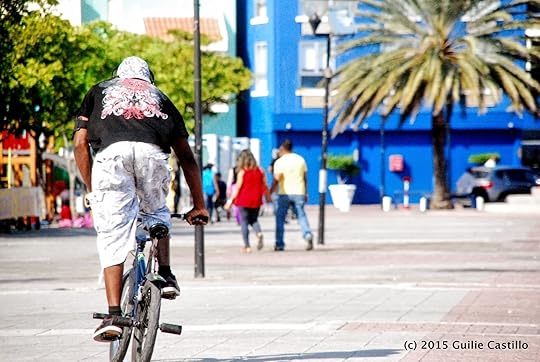 Watch out for that lamppost, swa.
Watch out for that lamppost, swa.
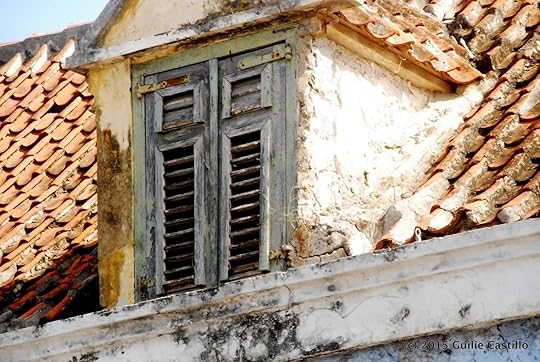 I really like this photo, swa.It rounds out nicely some expressions you already know:
I really like this photo, swa.It rounds out nicely some expressions you already know:
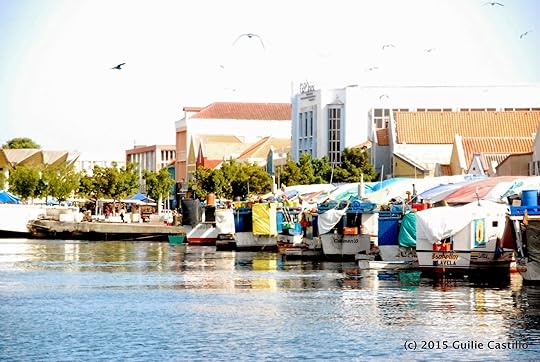 The floating market in Punda. Hopi néchi, swa!
The floating market in Punda. Hopi néchi, swa!
And it can also be used as a greeting:
But it's never used to refer to someone. You'd never say, for instance, "Look at that swa over there, the one with the red shirt," or "Yeah, I know Edson. He's my swa."
Felis djaweps, swa!
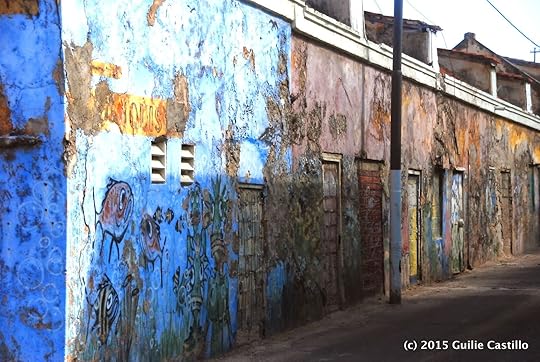
Oh, and to Debbie of The Doglady's Den: congratulations, swa! She guessed right on yesterday's renchi, and is in the draw (again!) to win a copy of The Miracle of Small Things, short stories about Curaçao :)
Literally: brother-in-law (from the Dutch zwager)
In context: man, bro
Swa is to Papiamentu what man (or bro) is to English.
 Watch out for that lamppost, swa.
Watch out for that lamppost, swa."... you end your sentences in swa."Yes, even when not speaking to your brother-in-law or, for that matter, to any member of your family. (And yes, the implication is that you're sleeping with the sister of whoever you're talking to, but no one takes that literally. And women use it, too. To other women.)
You, mopping your sweaty forehead: "It's hot today, swa."
(English: It's hot today, man.)
Leaving a party at 5:00 am, to your host: "Great party, swa!"
(English: Great party, bro!)
 I really like this photo, swa.It rounds out nicely some expressions you already know:
I really like this photo, swa.It rounds out nicely some expressions you already know:"Ai no, swa!"
(English: Aw, man! -- the kind of thing you'd say after missing an easy shot on the tennis court, or playing pool or soccer)
"Hopi master, swa!"
(English: F*ckin' A, man!)
"Néchi, swa!"
(English: Looking spiffy, man!)
"Ei ta palu, swa."
(English: Abso-f*ckin'-lutely, bro.)
"Hopi ferfelu, swa."
(English: Not cool, man.)
"Hopi laf, swa."
(English: This is lame, bro.)
 The floating market in Punda. Hopi néchi, swa!
The floating market in Punda. Hopi néchi, swa!And it can also be used as a greeting:
"Hey, swa. Kon ta?"
(English: Hey, bro. How's it going?)
But it's never used to refer to someone. You'd never say, for instance, "Look at that swa over there, the one with the red shirt," or "Yeah, I know Edson. He's my swa."
Felis djaweps, swa!

Oh, and to Debbie of The Doglady's Den: congratulations, swa! She guessed right on yesterday's renchi, and is in the draw (again!) to win a copy of The Miracle of Small Things, short stories about Curaçao :)
Published on April 23, 2015 07:22
April 22, 2015
Redu! -- Quirks of Language in #Curaçao (#AtoZChallenge 2015)
Redu
[RED-doo]
Literally: gossip (n.)(the verb is, officially at least, redashi)Origin: I think it comes from the Spanish enredo, though the Dutch (roddel) is also close.
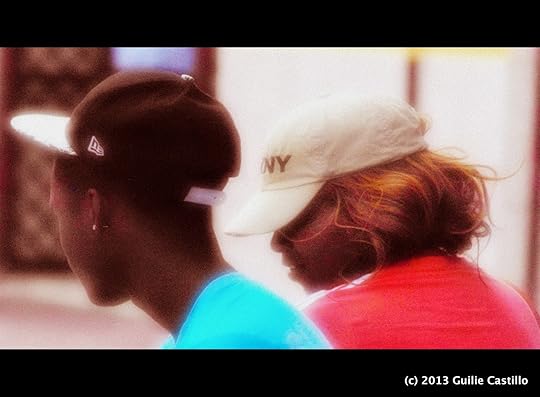 A colleague of yours, normally drab and homely, shows up at the office in sexy high heels and a new haircut. At lunchtime, someone says they know why--she has a new boyfriend. You -- and everyone else within earshot -- crowd in closer, saying, "
Redu, redu
!"(English: Let that poor, suffocating cat out of the damn bag!)
A colleague of yours, normally drab and homely, shows up at the office in sexy high heels and a new haircut. At lunchtime, someone says they know why--she has a new boyfriend. You -- and everyone else within earshot -- crowd in closer, saying, "
Redu, redu
!"(English: Let that poor, suffocating cat out of the damn bag!)
At a dinner party, someone walks in on you and a friend having a private conversation in the kitchen. The new arrival immediately wants to know if you were discussing X or Y person.
You, only half joking: " Redu bo ke sa."
(Translates more or less literally as "You want to hear gossip", but used in context it's more like a not-quite-so-confrontational "Mind your own business".)
Although the verb is redashi, it's more often conjugated as doing redu. For instance:
Your friend, a notorious gossip, is criticizing someone for spreading rumors. You: "But, dushi, you do redu also."
(English: "You gossip, too.")
 See that couple sitting in the U? When the girl saw me and my camera she sat back to hide her face.
See that couple sitting in the U? When the girl saw me and my camera she sat back to hide her face.
Shyness, or did she not want photographic evidence of a tryst? Redu, redu!
Today's bonus:
renchi [REN-chee]
Hint:

And congratulations to Sabina (of Victim to Charm, truly cool blog about the college life) for guessing miracle on the last bonus word -- you're now in the draw to win the short story collection about Curaçao, most aptly titled The Miracle of Small Things :)
 A colleague of yours, normally drab and homely, shows up at the office in sexy high heels and a new haircut. At lunchtime, someone says they know why--she has a new boyfriend. You -- and everyone else within earshot -- crowd in closer, saying, "
Redu, redu
!"(English: Let that poor, suffocating cat out of the damn bag!)
A colleague of yours, normally drab and homely, shows up at the office in sexy high heels and a new haircut. At lunchtime, someone says they know why--she has a new boyfriend. You -- and everyone else within earshot -- crowd in closer, saying, "
Redu, redu
!"(English: Let that poor, suffocating cat out of the damn bag!)At a dinner party, someone walks in on you and a friend having a private conversation in the kitchen. The new arrival immediately wants to know if you were discussing X or Y person.
You, only half joking: " Redu bo ke sa."
(Translates more or less literally as "You want to hear gossip", but used in context it's more like a not-quite-so-confrontational "Mind your own business".)
Although the verb is redashi, it's more often conjugated as doing redu. For instance:
Your friend, a notorious gossip, is criticizing someone for spreading rumors. You: "But, dushi, you do redu also."
(English: "You gossip, too.")
 See that couple sitting in the U? When the girl saw me and my camera she sat back to hide her face.
See that couple sitting in the U? When the girl saw me and my camera she sat back to hide her face.Shyness, or did she not want photographic evidence of a tryst? Redu, redu!
Today's bonus:
renchi [REN-chee]
Hint:

And congratulations to Sabina (of Victim to Charm, truly cool blog about the college life) for guessing miracle on the last bonus word -- you're now in the draw to win the short story collection about Curaçao, most aptly titled The Miracle of Small Things :)
Published on April 22, 2015 04:30
April 21, 2015
(No More) Queen's Day -- Quirks of #Curacao in the #AtoZChallenge 2015
Okay, so this isn't really language-related, and it's not exclusive to Curaçao. But, this island being part of the Dutch kingdom, I think it qualifies as a quirk I can expound on for my Q post. (And, also, there are no Q words in Papiamentu.)
On April 30, 2013, Queen Beatrix of the Netherlands abdicated in favor of her son, Willem Alexander, thereby giving the Dutch kingdom its first king in over a century -- and putting an end to one hundred and twenty-plus years of celebrating Queen's Day.
Queen's Day started out, on the last day of August 1885, as Princessedag: to celebrate the birthday of King Willem III's daughter, Princess Wilhelmina, who turned a tender five that year. Five years later, when her father died and Wilhelmina became Queen, the holiday got the name it would become known for the world over: Koninginnedag.
Queen's Day in Queen Wilhelmina's Day & Age...
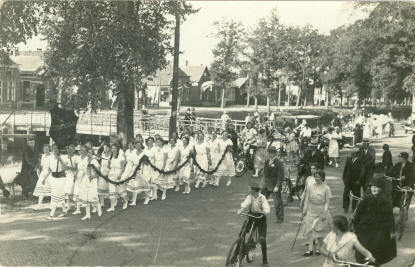
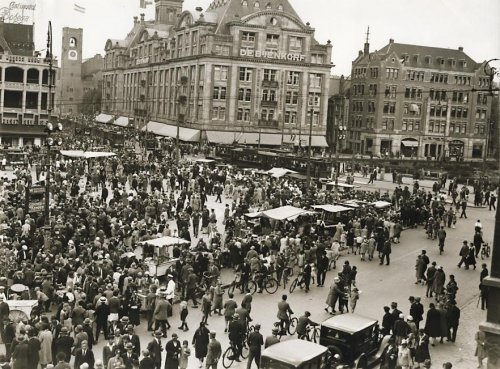

Wilhelmina's successor, Queen Juliana, kept the holiday but changed the date to her own birthday: April 30th.
... and in Juliana's Day...

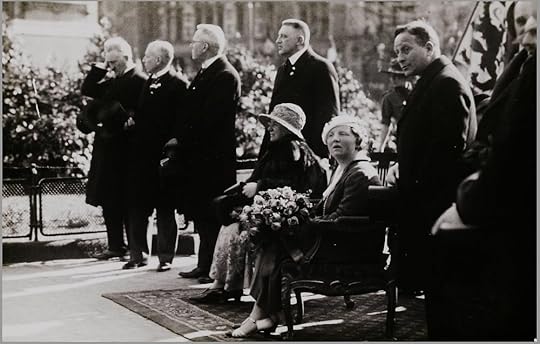
Juliana's own successor, Beatrix, was born on January 31st, right in the middle of winter -- and who wants to celebrate anything, even a royal b-day, in the middle of winter. So Queen's Day kept on being April 30.
... and celebrations turned a tad wilder...

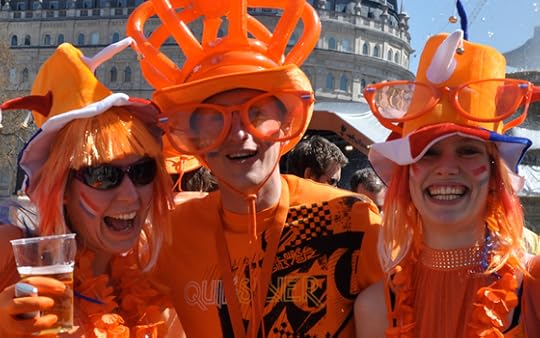
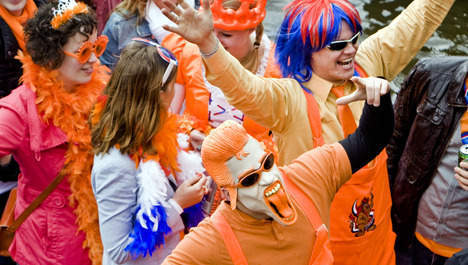
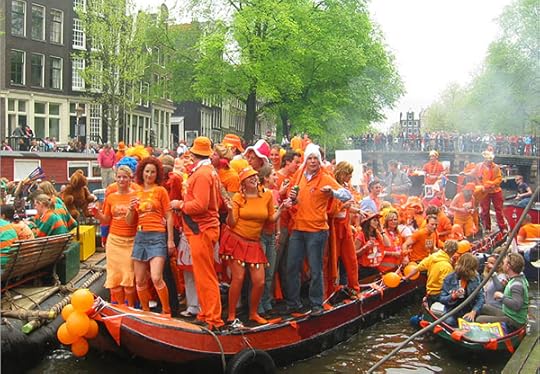
... even in the kingdom's farthest Caribbean shores. (Just a bit.)
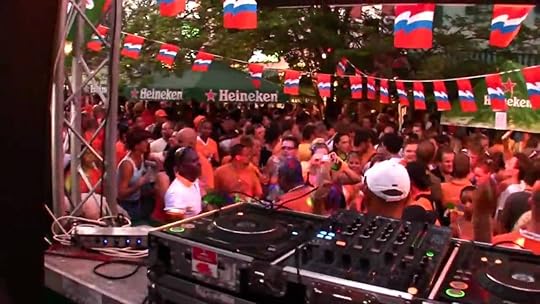

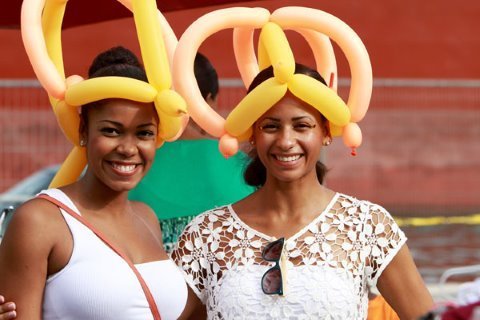
With Willem Alexander's accession to the throne, the holiday became Koningsdag (King's Day) -- and is celebrated on April 27, ol' Double-Ya Ey's birthday.
Well, except the first one. See, the first King's Day -- in history! -- was supposed to be April 27 2014, but it fell on a Sunday... And even a king knows you don't make friends by moving a day off to a weekend. Wisely, he chose to begin this revised tradition in 2015, when the 27th is a Monday. Yep. Next weekend is a long weekend for the Dutch kingdom.
From solemn flower girls and military parades to... Well.(It's probably a good thing Queen Wilhelmina didn't live to see the, uh, evolution of her birthday celebrations)

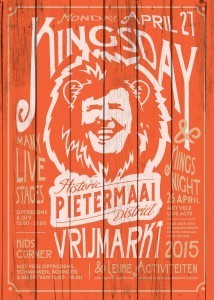 Yes. That lion has Willem Alexander's -- the king's -- face.
Yes. That lion has Willem Alexander's -- the king's -- face.
On April 30, 2013, Queen Beatrix of the Netherlands abdicated in favor of her son, Willem Alexander, thereby giving the Dutch kingdom its first king in over a century -- and putting an end to one hundred and twenty-plus years of celebrating Queen's Day.
Queen's Day started out, on the last day of August 1885, as Princessedag: to celebrate the birthday of King Willem III's daughter, Princess Wilhelmina, who turned a tender five that year. Five years later, when her father died and Wilhelmina became Queen, the holiday got the name it would become known for the world over: Koninginnedag.
Queen's Day in Queen Wilhelmina's Day & Age...



Wilhelmina's successor, Queen Juliana, kept the holiday but changed the date to her own birthday: April 30th.
... and in Juliana's Day...


Juliana's own successor, Beatrix, was born on January 31st, right in the middle of winter -- and who wants to celebrate anything, even a royal b-day, in the middle of winter. So Queen's Day kept on being April 30.
... and celebrations turned a tad wilder...




... even in the kingdom's farthest Caribbean shores. (Just a bit.)



With Willem Alexander's accession to the throne, the holiday became Koningsdag (King's Day) -- and is celebrated on April 27, ol' Double-Ya Ey's birthday.
Well, except the first one. See, the first King's Day -- in history! -- was supposed to be April 27 2014, but it fell on a Sunday... And even a king knows you don't make friends by moving a day off to a weekend. Wisely, he chose to begin this revised tradition in 2015, when the 27th is a Monday. Yep. Next weekend is a long weekend for the Dutch kingdom.
From solemn flower girls and military parades to... Well.(It's probably a good thing Queen Wilhelmina didn't live to see the, uh, evolution of her birthday celebrations)

 Yes. That lion has Willem Alexander's -- the king's -- face.
Yes. That lion has Willem Alexander's -- the king's -- face.
Published on April 21, 2015 18:32
April 18, 2015
Otrobanda & Punda -- Quirks of #Curaçao (#AtoZChallenge 2015)
Seeing as I missed yesterday's O post, you're entitled to a two-for-one today. And Curaçao has a unique feature for that.
Downtown Willemstad, the capital (and only) city of Curaçao, is divided--quite literally, and quite conveniently for this post--in two by the Sint Annabaai (Bay of Saint Anna). It's more of a channel than a bay--part of the natural harbor that made Curaçao so valuable to Spanish and Portuguese and Dutch merchant ships (or pirates, depending on which side you're on) back in the days when transatlantic voyaging was a novelty.
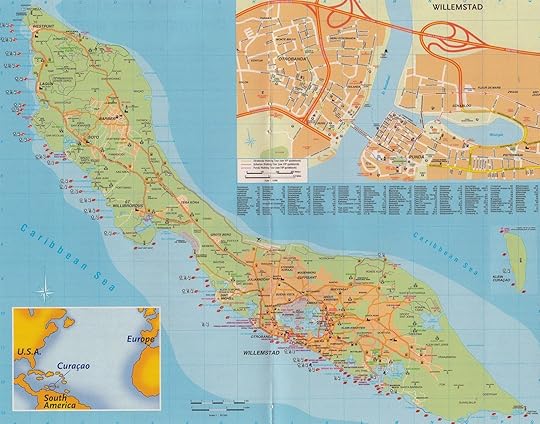
Punda (point, in Papiamentu) is on the right--on the right hand, but also, being upwind (or ariba), on the right side of the tracks--or the water, in this case. Punda was where commerce flourished; first the slave trade (Curaçao was the first port of call for slave ships into the Americas), later the lesser tarnished (if not much more ethical) forms of capitalism.
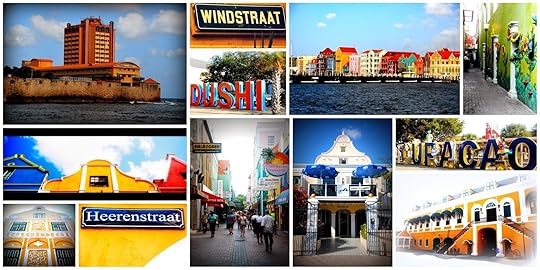 Views of PundaAcross the water is Otrobanda (literally, other side). Downwind, abou, the wrong side of town. For a long time it lay ignored, ancient buildings falling from picturesque into plain old disrepair. Now it's where cruise ships dock, and home to the newest addition in Curaçao's hospitality industry, the Renaissance. The Rif Fort, beautifully preserved and conscientiously converted into an open-air mall, shouts silent and righteous derision across the Sint Annabaai at its once-sister fort, Fort Amsterdam, partially demolished to make way for that pink abomination, the Plaza hotel (upper left corner in the Views of Punda collage above).
Views of PundaAcross the water is Otrobanda (literally, other side). Downwind, abou, the wrong side of town. For a long time it lay ignored, ancient buildings falling from picturesque into plain old disrepair. Now it's where cruise ships dock, and home to the newest addition in Curaçao's hospitality industry, the Renaissance. The Rif Fort, beautifully preserved and conscientiously converted into an open-air mall, shouts silent and righteous derision across the Sint Annabaai at its once-sister fort, Fort Amsterdam, partially demolished to make way for that pink abomination, the Plaza hotel (upper left corner in the Views of Punda collage above).
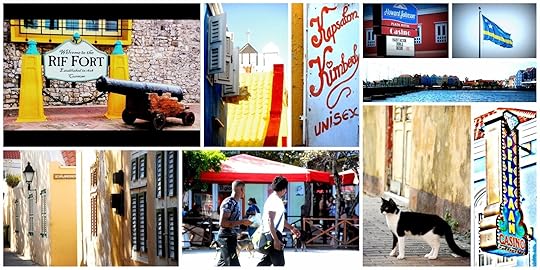 Views of Otrobanda
Views of Otrobanda
Downtown Willemstad, the capital (and only) city of Curaçao, is divided--quite literally, and quite conveniently for this post--in two by the Sint Annabaai (Bay of Saint Anna). It's more of a channel than a bay--part of the natural harbor that made Curaçao so valuable to Spanish and Portuguese and Dutch merchant ships (or pirates, depending on which side you're on) back in the days when transatlantic voyaging was a novelty.

Punda (point, in Papiamentu) is on the right--on the right hand, but also, being upwind (or ariba), on the right side of the tracks--or the water, in this case. Punda was where commerce flourished; first the slave trade (Curaçao was the first port of call for slave ships into the Americas), later the lesser tarnished (if not much more ethical) forms of capitalism.
 Views of PundaAcross the water is Otrobanda (literally, other side). Downwind, abou, the wrong side of town. For a long time it lay ignored, ancient buildings falling from picturesque into plain old disrepair. Now it's where cruise ships dock, and home to the newest addition in Curaçao's hospitality industry, the Renaissance. The Rif Fort, beautifully preserved and conscientiously converted into an open-air mall, shouts silent and righteous derision across the Sint Annabaai at its once-sister fort, Fort Amsterdam, partially demolished to make way for that pink abomination, the Plaza hotel (upper left corner in the Views of Punda collage above).
Views of PundaAcross the water is Otrobanda (literally, other side). Downwind, abou, the wrong side of town. For a long time it lay ignored, ancient buildings falling from picturesque into plain old disrepair. Now it's where cruise ships dock, and home to the newest addition in Curaçao's hospitality industry, the Renaissance. The Rif Fort, beautifully preserved and conscientiously converted into an open-air mall, shouts silent and righteous derision across the Sint Annabaai at its once-sister fort, Fort Amsterdam, partially demolished to make way for that pink abomination, the Plaza hotel (upper left corner in the Views of Punda collage above). Views of Otrobanda
Views of Otrobanda
Published on April 18, 2015 19:28



